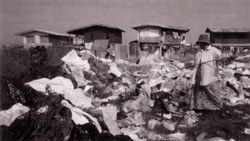THAILAND
 Bangkok has long been overwhelmed by the inevitable by-product of modern economic growth - waste. But now investors are swarming in to set up and operate what could be one of Southeast Asia's largest waste disposal programmes.
Bangkok has long been overwhelmed by the inevitable by-product of modern economic growth - waste. But now investors are swarming in to set up and operate what could be one of Southeast Asia's largest waste disposal programmes.
After the Bangkok Municipal Authority invited tenders to set up and operate a garbage disposal plant, 112 companies responded, including big names like Sumitomo of Japan and Waste Management of the us. But there is a seamier side to the story of waste disposal: waste storage capacities in industrialised countries are becoming saturated or becoming too expensive. According to Greenpeace, waste storage cost in parts of Asia can be as low as us $40 a tonne, compared to us $1,000-1,500 in Europe and the us.
"Despite having elaborate environment protection laws covering the safe storage, treatment and disposal of waste, most Asian countries lack the administrative or technological means to enforce their laws or even assess how much waste is being produced or imported," says Srisuwan Kuankachorn, director of the Bangkok-based Project for Ecological recovery.
Related Content
- Integrating co-benefits into Nationally Determined Contributions, climate policies and air pollution policies in Asia
- Fossil fuel subsidies and GHG emissions: firm-level empirical evidence from developing Asia
- International labour migration in a changing climate: insights from Malaysia and Thailand
- Thailand’s clean electricity transition: how accelerated deployment of renewables can help achieve Thailand’s climate targets
- Modeling traffic congestion effects on air pollutants
- Gender, health and air pollution
